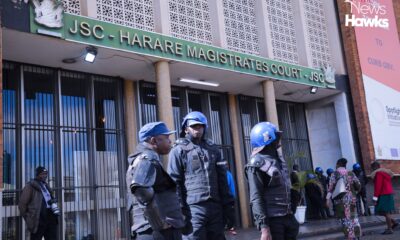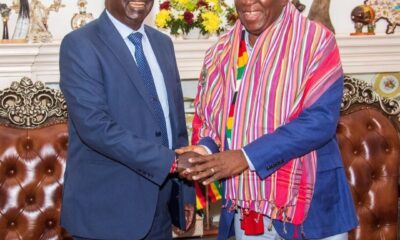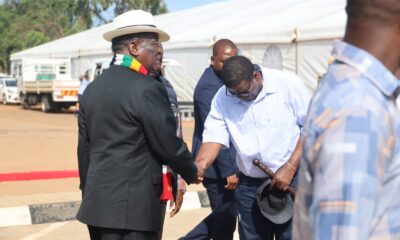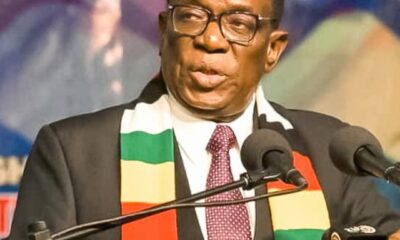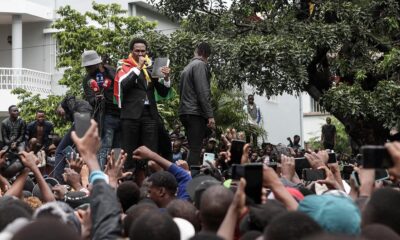
Opinion
Russia’s Resurgence in Africa: Zimbabwe and Mozambique
Published
4 years agoon
By
NewsHawksDZVINKA KACHUR
While Russia’s relationship with Africa goes back decades, to the continent’s anti-colonial struggles, the past few years have seen a resurgence in relations.
Executive summary
While Russia’s relationship with Africa goes back decades, to the continent’s anti-colonial struggles, the past few years have seen a resurgence in relations. The 2019 Russia-Africa Summit is only the most visible sign that the Putin regime is interested in reawakening relations with African countries.
This is driven by declining global oil prices and continuing sanctions against Russia. This report takes a closer look at two examples of resurgent Africa–Russia relations: Zimbabwe and Mozambique. It gives a detailed mapping of Russian activities in these two countries, and shows how they have developed over time. While Russian actors are involved in a large number of projects in Zimbabwe and Mozambique, the main focus is on three sectors: the extractive industries, the arms trade, and political cooperation. Russian involvement in Zimbabwe has been driven by, and gained momentum from, both countries’ status as targets of Western sanctions. Mutual attempts to evade these sanctions have boosted the relationship, which has been cemented by high-level corruption. While Mozambique has more international options than its neighbour, elite–elite relationships play a key part in its dealings with Russia. This includes shadowy collaboration in the military and political realms. In addition, Russian actors have played significant roles in both countries’ elections, with contentious results. Thus, while Russia’s involvement in African countries like Mozambique and Zimbabwe is considerably narrower and more elite-directed than, for example, that of China, it is still becoming a notable player in Southern Africa, and one that deserves more attention.
Introduction
The Russia-Africa Summit in October 2019 drew attention to Russia’s growing presence on the continent. Its involvement with Africa is commonly associated with the decolonisation era, mercenaries, election meddling, arms deals and nuclear projects. This report takes a closer look at how true these perceptions are, by focusing on Russian engagements with two countries often seen as its close allies: Mozambique and Zimbabwe. The Russian economic presence on the continent is almost 10 times smaller than that of another great power – China – with US$20 billion vs US$200 billion worth of trade. Russia is not among the 10 countries with the highest foreign direct investment (FDI) from 2014–2018 (a group led by the US and France). Unlike China, Russia is also not among the top export partners of Zimbabwe, Mozambique or South Africa. And while Russian exports to Africa are growing steadily, almost two-thirds are still going to Algeria and Egypt; primarily consisting of military equipment and grain. Nevertheless, as Mozambiquan Foreign Affairs Minister Jose Condungua Pacheco has stated, while China and South Africa are Mozambique’s main partners, “there is room for Russia to become good partners with us too. We look at Russia as a good friend, and we want it to be our strategic partner in different fields.” Despite its limited economic presence, Russia remains an important player globally. It has veto power in the UN Security Council and has positioned itself together with its BRICS partners as a counterweight to Western countries. With its history of support for decolonisation and anti-apartheid movements, it widely uses anti-Western rhetoric, which it links to the promotion of the sovereignty of African states and acceptance of non-democratic forms of governance. It also has a high tolerance for corruption. Transparency International’s Corruption Perception 2019 Index ranked Russia at 137 out of 198, close to Mozambique (146) and Zimbabwe (158). In comparison, China is ranked at 80 and South Africa at 70. After the imposition of Western sanctions on Russian businesses and individuals in 2014, Russian activity on the continent increased significantly. The 2019 Russia-Africa Summit heralds a new strategy, and despite Covid-19 Russia is launching several institutions that could reprioritise Russian business interests in Africa.
The historical involvement of the Soviet Union in decolonisation on the continent gives it easier access to mineral resources at a time when the drop in oil prices and Western sanctions are causing significant economic challenges.
Historical connections: The Soviet Union and the anti-colonial struggle
The long-standing collaboration between the Soviet Union and both Mozambique and Zimbabwe can be seen in the coats of arms of the African countries—both are decorated with the Russian Kalashnikov assault rifle (AK-47). However, their respective relationships with Russia after independence differ significantly.
In December 1960, on the Soviet’s Union initiative, the UN General Assembly adopted the Declaration on the Granting of Independence to Colonial Countries and Peoples (UN General Assembly Resolution 1514 (XV)). This document became a milestone in the decolonisation process. Russia, as a successor of the Soviet Union, still stresses the importance of the comprehensive assistance and support provided.
Russia’s current activities in Africa are closely connected to President Vladimir Putin’s nationalistic vision of Russia and the idea of a multipolar world. Russia’s first president, Boris Yeltsin (1991–1999), did not make a single visit to the African continent. The collapse of the Soviet Union in 1991 led to a sudden change from a planned to a market economy and resulted in significant economic challenges. Russia became the inheritor of the Soviet Union, and for almost two decades it was focused on internal issues.
The Russian approach to Africa
Russia is an active player in the UN system, with a strong historical and military presence on the African continent. More recently it has become associated with energy interventions, especially nuclear and gas; and has been accused of using disinformation campaigns as political tools.
UN engagements
Russia is an active member of the UN and is promoting the restructuring of the UN system, in particular the UN Security Council (UNSC). This chimes with the AU’s push for UNSC reform, with Russia seen as a lobbying power that could facilitate greater African representation. Russia is also actively involved in providing African countries with humanitarian aid in areas like food security, public healthcare and the effects of climate change. In April 2019 tropical Cyclone Idai hit Mozambique and Zimbabwe, and Russia provided each country with tents, blankets and 30 tonnes of food. Russia also contributes to international assistance programmes (from which Africa benefits) in the framework of the UN Development Programme (UNDP), the World Food Programme (WFP) and the International Civil Defence Organisation. It is involved in the WFP’s US$40 million school meals project. Since 2011 WFP offices in Africa have received donations of 258 KAMAZ trucks, and another 75 trucks were shipped in 201915 as in-kind support. In addition, Russia supports efforts aimed at controlling the spread of infectious diseases (including Ebola), providing natural disaster relief, addressing existing conflicts and preventing new crises. In Mozambique and Zimbabwe it supports programmes against tuberculosis.
In 2018, Russia made US$1 million available to Zimbabwe to help the country implement its Low Emission Development Strategy as part of its nationally determined contributions under the Paris Agreement on climate change. The UNDP is implementing the three-year project in partnership with the Zimbabwean Ministry of Environment, Water and Climate.
The funding will be used to update technology in line with international emission standards and to facilitate partnerships with investors and companies, including Russian businesses and academic institutions, in order to foster collaboration and technological exchange for low emission development.
Russia has supported Zimbabwe’s tendency to distribute humanitarian aid mostly to Zanu PF’s political supporters. On 29 May 2020, to commemorate Africa Day, the Russian Embassy delivered gifts to war veterans’ families at the Zimbabwe African National Union (Zanu PF) headquarters. A total of 1.5 tonnes of staple goods was symbolically presented to Zanu PF’s secretary for war veteran affairs by the Russian ambassador.
The anti-West narrative
Putin has tried to use African countries’ historical relationships with the Soviet Union and the support provided to anti-colonial movements as an entry point to promote Russia’s economic agenda over that of Western countries with an active presence on the continent. The narrative is that Western countries are colonisers that exploit African nations under the pretext of promoting democracy, while the West’s stringent conditions on cooperation and trade are used to extend this neo-colonial power.
At the Russia-Africa Summit, Putin characterised the proposed cooperation between the two parties as “no strings attached”, meaning that financing need not follow the liberal principles of transparency and accountability. This approach could be seen in the 2014 nuclear deal with South Africa, which became one of the major examples of the state capture that almost collapsed the South African economy. Even after the corrupt relationships were revealed, ex-president Jacob Zuma insisted that “they [the Russians] will never sink us; they will lift us”. Zimbabwe’s President Emmerson Mnangagwa echoed these sentiments: “We feel very free to trade with the Russian Federation, than with any other Western country that colonised us … This is evidence from the past relation, no strings at all. This is in fact mutual trade, mutual relationship and mutual cooperation.”
Military cooperation
Globally, Russia is the second-largest arms exporter after the US, although its share of arms exports dropped from 27% in 2010–2014 to 21% in 2015–2019. Africa imported 49% in 2015-2019 (up from 39% in 2013-2017) of its military equipment from Russia, almost double the imports from the US (14%) and China (13%).33 Sub-Saharan Africa is responsible for 26% of the total African imports, with 36% of that coming from Russia.
Rosoboronexport contracts with Africa came to US$21 billion, out of its total of US$56 billion in 2016 (Rosoboronexport is the official Russian defence industry and dual-use product exporting agency). Instability on the African continent supports Russian exports, which are limited by sanctions. Russia does not disclose information about its arms exports, and thus data is scarce. However, in an interview with a local newspaper the Russian deputy defence minister said the ministry had signed over 100 agreements on military cooperation, and that cooperation with Mozambique increased after the Russia-Africa Summit. Rosoboronexport has long-term contracts with multiple African countries, including Zimbabwe, Egypt, Angola, Mali and Uganda. Cooperation with Mozambique, Cameroon, Tanzania and Equatorial Guinea has intensified since August 2014, when new contracts were signed. Nuclear cooperation.
New broad-based strategy for collaboration: Russia-Africa Summit The seriousness of Russia’s intention to return to Africa became apparent at the Russia– Africa Summit, which took place from 23-25 October 2019. A total of 43 African heads of state attended the summit, and 11 more sent high-level representation—significantly higher numbers than at UN meetings. This shows that Russia is seen as a strategically important partner for Africa. The slogan of the summit was “For Peace, Security and Development”. In his welcome speech Putin declared: We are not going to participate in a new “repartition” of the continent’s wealth; rather, we are ready to engage in competition for cooperation with Africa, provided that this competition is civilised and develops in compliance with the law. We have a lot to offer to our African friends. The underlying goal of the summit was to get the support of African states against the EU and US sanctions: “[T]ogether with our African partners, [we] are committed to protecting our common economic interests and defending them against unilateral sanctions, including by reducing our dollar dependency and switching to other currencies in mutual settlements.” The summit declaration also states support for the concept of a multipolar world and opposition to unilateral sanctions. This confirms that Russia is looking for partners that want to build a coalition against the West. As Putin put it, “Our African agenda is positive and future-oriented. We do not ally with someone against someone else, and we strongly oppose any geopolitical ‘games’ involving Africa.”
Zimbabwe: Russian political and economic engagements Zimbabwe, like Russia, has been the target of Western sanctions. In the case of Zimbabwe, these were imposed in February 2002 by the EU in response to the Zimbabwean government’s violation of basic human rights, including the rights to freedom of opinion, freedom of association and freedom of peaceful assembly. The sanctions include an embargo on arms sales, as well as travel and financial sanctions. In February 2004, the restrictions were tightened with an added prohibition on interactions that “grant, sell, supply or transfer technical assistance related to military equipment”. On 12 July 2008 the US and the UK proposed a draft resolution at the UN Security Council for UN-targeted sanctions against Zimbabwe that would include an arms embargo, a travel ban and a financial freeze targeted at the president and 13 senior government and security officials. Russia and China vetoed it. Zimbabwe returned the favour in March 2014 when it was among 11 countries that voted against the UN resolution on Ukraine’s territorial integrity, which underscored the invalidity of the Russia-organised Crimean referendum and the Russian annexation of the territory. The non-binding resolution was approved by 100 votes in the UN General Assembly 59 with 58 abstentions (including Mozambique).
The economic relationship between the countries was cemented by the Bilateral Investment Protection and Promotion Agreement (BIPPA), signed in October 2012. In August 2012, at the same time as when the first platinum ore was being mined at the Russia-Zimbabwe platinum mine Darwendale, a powerful Russian business delegation, led by the Russian deputy minister of industry and commerce, visited Zimbabwe and expressed a keen interest in investing in the mining and energy sectors.
On the minister’s agenda was ensuring investments in the Darwendale platinum mine, needed for further exploration. He also announced a cooperation deal between Zimbabwe and Russian state oil company Rosneft. Rosneft was to construct a pipeline for refined oil from Mozambique to Zimbabwe in a joint venture that included all three countries. There were also plans for Rosneft to extend the pipeline to Botswana, Zambia and Malawi and to repair the existing pipeline.66 Russia was ready to provide financial support for the project’s implementation and needed investment protection.
Conclusion
Russia’s economic presence in Africa is limited, and it cannot compete either with traditional powers like the US, UK, France and Germany or with new powers like China. However, its historical involvement in anti-colonial struggles, as well as its political patronage in the UN and other multilateral institutions, gives it access to a specific niche of economic cooperation based on an “anti-Western ideology”.
Russian collaboration is based on agreements with relaxed rules around transparency, accountability, corruption and democracy. Such agreements compromise the development of African countries like Mozambique and Zimbabwe into liberal democracies. The political leadership of both Mozambique and Zimbabwe has sought support from Russia in maintaining their power in the face of internal political opposition, and has been enthusiastic in using their countries’ natural resources to remain in power. It is revealing that presidents from both countries visited Russia at the time of elections to secure further support. This support is both military and non-military. For example, after President Nyusi’s visit to Russia in August 2019 he received military support and mercenaries to manage the insurrection in the Cabo Delgado region, while Russian proxy organisation AFRIC rubberstamped the election results. This support came in exchange for access to natural resources. Western sanctions against Russia, as well as a drop in oil prices, have increased its interest in and presence on the African continent.
However, Russian economic activity in Africa is still concentrated around the arms trade and the exploitation of natural resources. The successful 2019 Russia-Africa Summit was aimed at revitalising the relationship between Russia and the continent. In September 2020 Russia followed up by setting up the Russia-Africa Partnership Forum and its secretariat to boost economic and political collaboration. However, the exploitation of natural resources remains a priority, with the six companies chosen to drive economic cooperation within the newly established forum all possessing strong links to the resources sector: Gazprombank, Transmashholding, Vi Holding, Uralkali, Alrosa and Rosatom. Despite its declared intentions, Russia struggles to ensure as broad-based a collaboration with African countries as China does. The analysis of Russian business activities in Zimbabwe and Mozambique provides insights into the factors that limit opportunities for economic collaboration: ∙ the struggling Russian economy has limited capabilities, and some Russian offerings, such as arms or nuclear technology, are not necessarily appropriate for African countries; ∙ the high transactional costs of dealing with Putin’s centralised political system, which requires large kickbacks, make Russian offerings more expensive; and large-scale projects to develop natural resources struggle to secure international funding owing to sanctions.
To fund its economic ambitions in Africa, Russia has pursued close cooperation with Afreximbank, which helps member countries to secure non-traditional funding. Nevertheless, the GDI project in Zimbabwe demonstrates the challenges of attracting independent funding for Russia-linked projects. It will become clearer over the next few years whether this mechanism, as well as the closer relations forged by the Russia-Africa Partnership Forum, will allow Russian projects in Africa to develop. However, continued sanctions and high levels of corruption on both sides remain significant constraints on real development cooperation.
About the writer: Dzvinka Kachur is a researcher at the Centre for Complex Systems in Transition at Stellenbosch University in South Africa. She holds degrees from the University of Oxford (MSc) and the National University of Kyiv-Mohyla Academy (MSc). This article is part of a 52-page paper originally published by the South African Institute of International Affairs.
You may like

